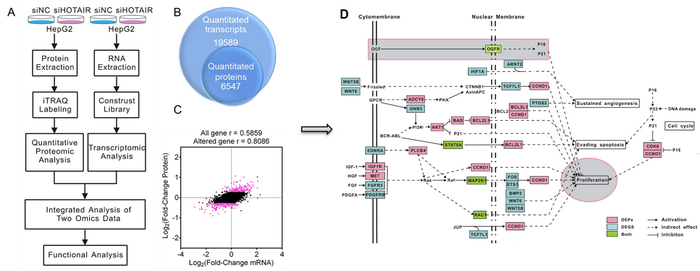
Newsroom
Long Non-coding RNA HOX Transcript Antisense RNA Promotes Hepatocellular Carcinoma Cell Proliferation by Regulating Opioid Growth Factor Receptor
Long non-coding RNA HOX transcript antisense RNA (HOTAIR) plays an important role in various cancers, including hepatocellular carcinoma (HCC), which is one of the most prevalent and deadly cancers among human population. However, the mechanisms of HOTAIR in HCC are not well known.
Recently, a research team led by Prof. GE Feng from Institution of Hydrobiology (IHB) of Chinese Academy of Sciences (CAS) has made new progress in the investigation of new mechanisms of HOTAIR in HCC. They performed an integrated omic analysis (transcriptomic combined with quantitative proteomic analysis) to screen the potential regulatory effectors of HOTAIR in HCC cells.
They found that hundreds of genes and proteins were dysregulated after HOTAIR suppression, providing a global view for the mechanisms of action of HOTAIR in HCC and reveals the complexity of HOTAIR regulation. They also did a series of bioinformatics analyses and the results showed that differentially expressed genes and proteins were implicated in some critical signaling pathways including pathways that related to cell proliferation, cell cycle and cell apoptosis.
After further studies, they found a negative biological regulator of cell proliferation in diverse human cancers including HCC named opioid growth factor receptor (OGFr) was significantly upregulated after HOTAIR inhibition. They then carried out functional studies of the OGFr and found that the effects of HOTAIR knockdown on cell proliferation and the cell cycle in HCC cells can be mimicked by OGFr overexpression. So they concluded that HOTAIR may exert its effects on HCC cell proliferation through the regulation of OGFr expression.
Their study shed light on the molecular basis of the regulatory role of HOTAIR in the progression of human HCC.
This work was published in the journal Molecular & Cellular Proteomics with the title of "Integrated proteomic and transcriptomic analysis revealslong noncoding RNA HOTAIR promotes hepatocellular carcinoma cell proliferation by regulating opioid growth factor receptor (OGFr)". It was supported by the National Natural Science Foundation of China (Grant No. 31370746 & No. 91540102), the Strategic Priority Research Program of the Chinese Academy of Sciences (grant no. XDB14030202).

Integrated transcriptomics and proteomics analysis revealing the novel molecular mechanisms of HOTAIR in HCC cells. (Figure by IHB)